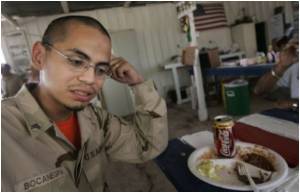U.S. Marines investigate the association between traumatic brain injury (TBI) and the risk of post-traumatic stress disorder (PTSD) over time.

The findings are published in the December 11 online issue of JAMA Psychiatry.
The team, headed by principal investigator Dewleen G. Baker, MD, research director at the VA Center of Excellence for Stress and Mental Health, professor in the Department of Psychiatry at UC San Diego and a practicing psychiatrist in the VA San Diego Healthcare System, analyzed 1,648 active-duty Marines and Navy servicemen from four infantry battalions of the First Marine Division based at Camp Pendleton in north San Diego County. The servicemen were evaluated approximately one month before a scheduled 7-month deployment to Iraq or Afghanistan, one week after deployment had concluded, and again three and six months later.
PTSD is a psychiatric condition in which stress reactions become abnormal, chronic and may worsen over time. The condition is linked to depression, suicidal tendencies, substance abuse, memory and cognition dysfunction and other health problems.
The servicemen were assessed at each evaluation using the Clinician-Administered PTSD Scale or CAPS, a structured interview widely employed to diagnose PTSD and severity. Researchers asked about any head injuries sustained prior to joining the service and any head injuries sustained during deployment from a blast or explosion, vehicle accident, fall or head wound from a bullet or fragment.
Traumatic brain injuries are common. At least 1.7 million Americans annually sustain a TBI, with an estimated 5 million Americans living with TBI-related disabilities. More than half (56.8 percent) of the servicemen reported a TBI prior to deployment; almost a fifth (19.8 percent) reported a TBI during deployment. The vast majority of deployment-related TBIs (87.2 percent) were deemed mild, with less than 24 hours of post-traumatic amnesia. Of the 117 Marines whose TBI resulted in lost consciousness, 111 said it was less than 30 minutes.
Advertisement
"The severity of post-deployment PTSD symptoms depends, in part, on the severity of pre-existing symptoms from prior trauma and combat intensity," said Baker. "An individual with no pre-existing PTSD symptoms and low combat intensity is at minimal risk for developing PTSD – less than a 1 percent probability." Increases in pre-existing symptom scores and combat intensity modestly increase post-deployment symptom scores by 1 to 2 percent.
Advertisement
Baker noted many factors, both environmental and individual, may contribute to development of PTSD. Two of the most important are pre-existing psychiatric symptoms and the nature of the "trauma event."
"However, TBI was the strongest predictor of PTSD, even when controlling for pre-existing symptoms and combat intensity," she said. "These findings may be used to identify individuals who may be at risk for developing PTSD and provide them with more immediate health care."
Source-Eurekalert















